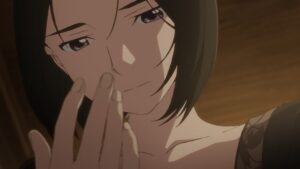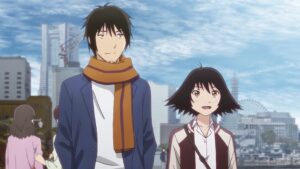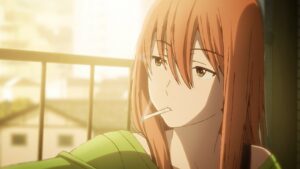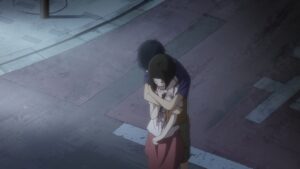Yesterday wo Utatte is my favorite spring anime, so please don’t take my delay in covering it as a sign of disinterest. It’s one of only two shows that I watch on the day it releases (the other being Kaguya-sama). Its ability to introduce new characters and immediately dimensionalize them is exceptional, as it demonstrated in two of these four episodes. It also has a keen sense of where to aim its lens each week, using individual spotlights or telling stories in parallel to get the most from its cast of characters. Yesterday wo Utatte deserves better than this post (and this author), but here we are, a month behind due to self-quarantine blues, and I’ve got to publish something or I’ll never escape this rut. If you’re digging this show as much as I am, hit the jump for abbreviated thoughts on episodes 4-7, in that order (no lazy list post this time).
“As the River Flows, Shinako Returns Home” (ep 4)
The first three episodes highlighted Rikuo, Shinako and Haru’s characters, respectively, but I wasn’t sure whether Yesterday would do the same for Rou. Of the four principal cast members, his connection to the others is the flimsiest, being the younger brother of Shinako’s old flame and not much else. To rectify that issue, this episode brought all the characters up to speed on the status of their love square, generating tension between Rikuo and Rou (much to Haru’s amusement). That convenience store scene was fine, but it wasn’t a highlight – Rou’s confession to Shinako, on the other hand, had me damn near spellbound. Their conversation shifted from comfortable to hurtful, with specific word choices hinting at Rou’s resentment of both his older brother and the girl who loved him. By the end of the scene, it felt like their relationship had been permanently altered, which is one of the marks of successful dramatic writing. Shinako’s visit to Yuu’s childhood home was a great moment, too – I loved the blurring of past and present that occurred when she appeared in her high school uniform, as though she had been transported in time. What a nostalgia overload that scene was.
“The Man Named Minato” (ep 5)
This was a detour onto New Character Avenue, as we met and subsequently bid goodbye to Minato, a humorless young man who briefly held a job at Rikuo’s gallery. The two guys are very different; Minato is straightforward, dedicated, and a skilled cameraman, while the hallmark of Rikuo’s character is his reluctance to express himself (plus, he’s an amateur photographer). The show did a great job of establishing Minato’s role in the story by giving him a history with Haru, then paralleling their one-sided crushes. When he reveals his intention to leave Japan and find inspiration, Haru asks him for a handshake, which I felt was a great decision. She’s not pitying him for having confessed his attraction to her – she’s honoring his commitment to his dream, which he values above education, stability, and even love. Minato was able to do something that she couldn’t (leave behind a failing romance in pursuit of something greater), and I think she was impressed by that. And lest we get the impression that his love was a shallow one, the episode ends with his winning gallery submission – a portrait of a contemplative Haru.
“The Woman Named Yuzuhara” (ep 6)
It says a lot about Yuzuhara Chika that she was able to carry this episode to such heights, even as it reused the “Rikuo gets a cold” plot from three weeks prior. The first thing that struck me was her sexuality, which anime usually shies away from – that hesitant “I don’t mind” when Rikuo collapsed on top of her added multiple layers to their relationship in an instant. How close were they in high school before their breakup? How much of her acquiescence came from a lingering attraction, versus a sense of obligation after he gave her a place to stay? The show wisely refrained from answering those questions, opting instead to dig into her early emancipation from her parents, her lack of social attachments, and her love for the piano. Twenty minutes later, a full picture of a thoughtful, rebellious young woman had emerged. When Rikuo returned to his apartment one evening and found that Yuzuhara had moved out, he smiled and called her “selfish,” but really, her departure was an act of consideration. Rather than allow them to slip into an ill-fated relationship, she cleared a path for Shinako, whose growing interest in Rikuo was obvious to her. Yuzuhara’s character is my favorite thus far – she even made me appreciate the show’s wet blanket of a protagonist a bit more via association.
“Premonition of a Couple” (ep 7)
Where the previous episode was the show’s high point for me, I felt this one tread old ground too closely. Rou’s initial outburst at Shinako was pretty similar to the one from episode 4, but it lacked the venom of calling into question whether she had truly loved his brother. As a result, their subsequent reconciliation played rather plainly – but I did get a kick out of his female friends at art school pointing out that he’d been friendzoned. (Why doesn’t he just ask one of them out instead?) Unfortunately, his solution to this issue was to chase her down the street and give her a bear hug when she was emotionally vulnerable. Perhaps now their relationship will sustain the fracture that should have happened three weeks ago? I’m just not feeling much between these two, whereas Shinako’s forwardness with Rikuo at the end was a major turning point for the series. Each of the last few installments have slowly warmed her to the idea of dating someone, and while I don’t know if they’re the best match, I’m glad that Shinako is beginning to get over the ghost of her high school crush.




